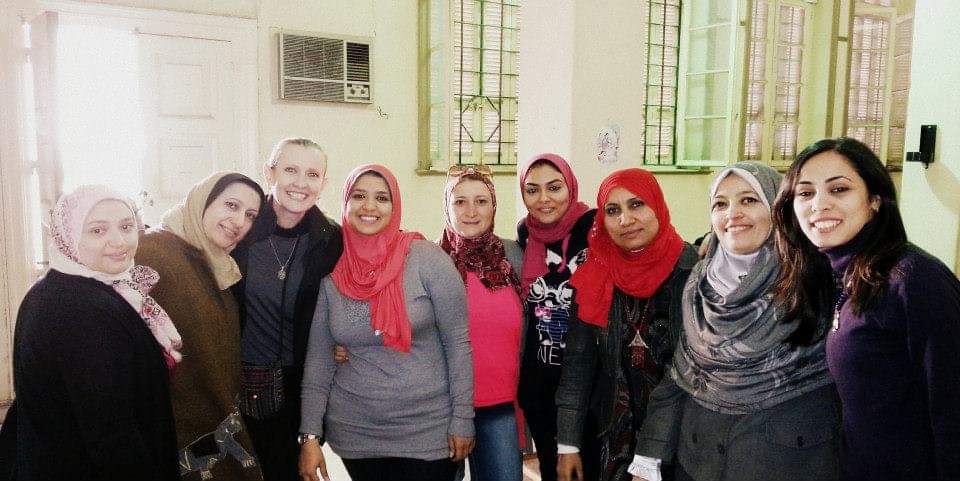My background
I have always been interested in the effectiveness of professional development in general and I recently came across some old papers from the final year (2016) of my master’s in education. The focus was on leading professional development, an area that has constituted a large part of my experience in education. At the time I was working as the Egypt Teacher Training Manager for, what was then CfBT (Centre for British Teachers, now Education Development Trust). I had spent the previous three and a half years based at Victory College in Alexandria, working with kindergarten and grade 1 to 3 English teachers. It was a fantastic job that I enjoyed very much despite, or maybe because of, the various challenges it presented. It was also a very interesting time to be in Egypt following the Arab Spring and during the time of the first elections. The added challenges due to the political situation made what the staff achieved even more admirable. This enjoyment continued with my move to Cairo, and work there with the National Institutes Training Centre, covering a number of schools in the city.
Having the opportunity to be fully involved with professional development whilst pursuing an academic qualification was very rewarding and insightful. We were very fortunate throughout the project to be able to work in the classrooms with teachers, supporting, demonstrating, and offering immediate feedback, as well as delivering tailor-made workshops on a regular basis. This was a similar model to other education reform projects on which I had worked in Qatar, Abu Dhabi, and Brunei, also for Education Development Trust. For most schools, such an intensive level of professional development is not something that can be realistically funded, but they can and do organise their own programmes.
What does the research say?
Having discovered the old papers and assignments I decided to revisit the ideas and research covered in them. I was particularly interested in what makes professional development effective. One paper in particular, Susannah Lydon & Chris King (2009), “Can a single, short continuing professional development workshop cause change in the classroom?”, summarised a wealth of interesting research around the effectiveness of CPD models. Various lists, of varying length, of components for successful CPD were identified by different research groups.
Joyce and Showers (1988)
- Exploration of theory
- Demonstration or modelling, practice under simulated conditions (including ‘peer teaching’
- Feedback
- Coaching in the classroom
Adey (2004)
- The Innovation
- has an adequate theory base
- introduces methods for which there is evidence of effectiveness
- is supported with appropriate high-quality materials
- The PD programme
- is of sufficient length and intensity
- uses methods which reflect the teaching methods being introduced
- included provision for in-school coaching
- Senior management in the school(s)
- are committed to the innovation
- share their vision with the implementing department leaders
- institute necessary structural change to ensure maintenance
- The teachers
- work in a group to share experiences
- communicate effectively amongst themselves about the innovation
- are given an opportunity to develop a sense of ownership of the innovation
- are supported in questioning their beliefs about teaching and learning
- have plenty of opportunity for practice and reflection.
Of course, teaching and learning are such complex processes, with a myriad of factors influencing outcomes. Whose choice is it to undertake professional development? Is it a top-down decision or a need that has been identified by staff themselves? Timescale? Is it whole-school? Who delivers the training?
Factors that positively impact on efficacy across the board seem to include collaboration, participant involvement in the process, and a supportive coaching model. In addition, the CPD should be sustained and not simply a one-off workshop.
But what exactly constitutes effective CPD? In a paper by Thomas Guskey (2003), “What makes Professional Development Effective?” he analysed 13 different lists of characteristics of effective professional development and found them to be “inconsistent and sometimes contradictory”. This problem arose in some part due to the fact that the research generally focused on surveys of opinions rather than rigorous exploration of an improvement in practice or student outcomes. How many surveys have we received or completed at the end of a workshop? A fun-filled session as part of the teacher orientation prior to a new term might be a nice way to ease back into work after the holidays, but does it actually have any impact in the classroom?
Guskey (2000) offered a model for the evaluation of CPD. There were five levels of outcome:
- Participant reactions
- Participant learning
- Organisational support and change
- Participants’ use of new knowledge and skills
- Student learning outcomes
Updates
Although 2016 does not seem that long ago, seven years is a fair amount of time. I thought it would be interesting to find a more recent paper by Guskey and see how research has developed since then. I came across a recent paper of his from 2021, “Professional Learning with Staying Power”. One immediately noticeable addition to this paper was then mention of COVID-19 and the growth in provision of and access to online learning programmes.
There are still differences in what constitutes effective professional development, but a general consensus on how effectiveness should be defined. Darling-Hammond, Hyler & Gardner (2017) judge professional learning to be effective when it has a “positive and enduring impact” on:
- school leadership,
- classroom practice, and
- student learning (extended beyond academic performance to include other factors, such as attendance, well-being, etc.
There is still a scarcity of evidence of effective professional development. In fact, quite the opposite. Jacob & McGovern (2015) quoted a report from the teacher recruitment group TNTP’ “In short, we bombard teachers with help, but most of it is not helpful – to teachers as professionals or to schools seeking better instruction”. All too often in schools the professional learning on offer seems to be more about ticking a box rather than genuinely looking at how to improve practice.
Guskey suggests the following six steps to improve the effectiveness of professional development:
- Focus on evidence-based practice.
- Provide guidance in balancing adaptations.
- Offer feedback to confirm the change makes a difference for students.
- Ensure the feedback is based on evidence teachers trust.
- Plan to gather evidence on effects quickly.
- Provide ongoing support… with pressure.
Further clarification of these points can be found in the online paper.
Can I help?
We now have access to a seemingly endless supply of online resources to help schools with their professional development needs. It can be difficult to navigate all of this and not necessarily find the best format to suit their particular context. School leaders must be clear in the goals they are hoping to achieve before planning any professional learning. What is the change they want to see? Once this is clear, appropriate content and processes can be added, with attention paid to the six points above.
As a freelance educational consultant, I can support schools in this process and offer a flexible, cost-effective package that helps design a tailor-made programme of professional learning. The importance of coaching and ongoing support has been referenced in a number of articles, and this is something that I can provide. In addition to a more traditional coaching model, I also offer PSYCH-K®, which is a proven modality for helping people access their subconscious minds, free themselves from self-limiting beliefs, and reach their full potential. It provides excellent additional support to staff, and indeed students.
Please feel free to contact me for more information or arrange an exploratory call.
Testimonials
Magda Fadle, KG Teacher Victory College Alexandria
Caroline came to work in my school in 2012 through a fully funded training programme provided by Education Development Trust. The aim of the programme was to improve the teaching of English Language in Kindergarten and Lower Primary, and prepare selected teachers for the Cambridge TKT:YL certificate. She worked closely with the teachers, providing weekly training sessions and classroom demonstrations and observations. This input showed me a new way of teaching. I was very happy to apply the strategies in my classes and saw a big change in my approach to classroom practice.
Nurul Khairizan Bte Hj Abd Kadir, Numeracy Local Coach, Literacy & Numeracy Coaching Programme, SM SMJA
Working with Caroline helped me build the confidence to go on and develop my own teacher training skills, and I have delivered three-day workshops to other teachers, as well as speaking at a conference in Jordan about the process of teacher professional development.
I had the privilege of being mentored by Caroline Milne back in 2017. Caroline showed complete professionalism, sharing new knowledge and experiences throughout the training. She was an excellent listener and genuinely considered suggestions and comments. Her personality quickly allowed her to become accepted and gained respect in our Maths department. She changed my teaching perspectives which allows me to take risks and try new strategies in my classroom. Her feedback is often kind and motivating. She made me realise why I chose this career. She has a wonderful balance of providing the exact amount of support for me to learn without pressure. It always feels like she was not mentoring but rather we were collaborating like a team.


